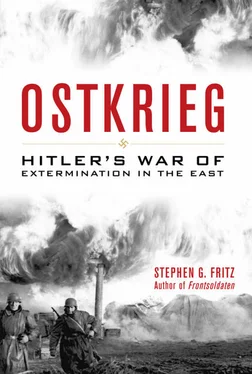Far from the arrogant, infallible, rigidly self-assured Führer of myth, Hitler had at that moment allowed Schmidt to glimpse the nearer reality: an uncertain figure whose guiding illusion had been crushed and who did not know how to proceed. His great gamble had failed, and what followed his invasion of Poland he neither wanted nor expected. His original intention had been to attack the Soviet Union with Polish help, but, when the Poles balked at playing their assigned role, he had hoped to neutralize Great Britain through the conclusion of the Nazi-Soviet Pact. This, he expected, would free his back in the west for a quick destruction of Poland followed by the showdown with Stalin’s Russia. Rather than fight the British, Hitler desired an alliance with England based on a common anti-Bolshevik attitude and a complementary relationship between a maritime and a continental power. What he got instead was a war with an Anglo-French alliance supported by the latent power of the United States. 14
The irony, then, was that the nation he had wooed for years had now become his implacable enemy while the country that he envisioned as his greatest adversary had emerged as his indispensable ally. Moreover, he had embroiled Germany in what looked to be, at minimum, a protracted war in the west against the two nations that had undone it in the Great War and with a woefully unprepared Wehrmacht in no way comparable to the powerful military force of 1914. Given Germany’s position in the middle of Europe, the nightmare of its military planners had always been a two-front war, but Hitler had now conjured precisely this specter. Nor did his generals put faith in a supposed war-winning blitzkrieg strategy, for such a plan did not exist. In fact, they had absorbed all too well the lesson of World War I: they no longer believed that wars could be won quickly against opponents of superior strength. “The fixation upon a short war has been ruinous for us,” asserted Colonel (later General) Georg Thomas, chief of the Wehrmacht Economic Staff in 1937. “We should therefore not be guided by the illusion of a short war in the age of air and Panzer squadrons.” A 1938 study confirmed this opinion, stating categorically, “The possibilities of defeating an equivalent opponent by means of a Blitzkrieg are zero…. It is not military force that is strongest; instead, it is economic power that has become the most important.” By plunging recklessly into war, Hitler had created a nearly insurmountable strategic dilemma for Germany: although his generals had worked out a plan of operations against Poland, no overall war-winning concept existed. 15
This was certainly not what Hitler intended. Since the mid-1920s, he had consistently expressed his desire to have Great Britain as an ally in the struggle against Jewish-Bolshevism. Although there were tantalizing hints of an alignment, such as the Naval Agreement of 1935 or Chamberlain’s policy of appeasement, by 1938 the hope of an alliance with Britain was illusory. If, in his ideologically blinkered world, the British did not act as Hitler wished, it meant that “world Jewry” had come to dominate in London and that “the Jew” had won over “the Briton.” 16This sense of a gathering worldwide Jewish conspiracy directed against Germany imparted a sense of urgency to Hitler’s actions in 1938–1939, as did his recognition that Britain was beginning a rapid, if belated, rearmament. Beyond this lay the vast latent power of the United States, which was also beginning to rearm and which Hitler had already identified in the late 1920s as the long-term opponent with which a German-dominated Europe would have to fight a war for world supremacy. The problem was many-sided. In order to protect Germany in its existential struggle with the Jewish conspiracy, German military power had to be restored in order to wage a successful war for Lebensraum. This meant a policy of rearmament that violated the Treaty of Versailles and threatened to alarm Germany’s neighbors. In addition, the provisions of the hated peace treaty had reduced German military strength so considerably that a crash program of rearmament would be necessary just to bring the military to adequate levels of self-defense. Moreover, all this was to be undertaken in a country only beginning to recover from the enormous economic and psychological trauma of the Great Depression. Just as the Nazis were beginning to reap the benefits of economic recovery, any overly ambitious rearmament program would imperil German economic recovery and Nazi popularity.
Hitler proved remarkably successful in striking a balance between these domestic and foreign policy demands between 1933 and 1936, but in August of that latter year, as he pondered Germany’s economic and political situation at the Eagle’s Nest on the Obersalzburg, he became more convinced than ever that Germany had to accelerate its preparations for war. His ideological fixation on struggle, along with his consciousness of Germany’s shrinking lead in rearmament, made the time factor increasingly important. In turn, this self-imposed time pressure inhibited the rational strategic calculations that had largely governed the first phase of his foreign policy. The result of his deliberations was a memorandum that he showed to a small circle of advisers: the defense minister, Werner von Blomberg, the builder of the autobahns and the West Wall, Fritz Todt, and the head of the German air force and de facto second in command to the Führer, Hermann Goering. Characteristically, Hitler felt compelled to justify his actions and, as usual, returned to his central argument of the necessity of war against Jewish-Bolshevism. “The historical struggle of nations for life,” he asserted, constituted the essence of politics; because of the growing military strength of the Soviet Union the world was moving “with ever-increasing speed towards a new conflict”; the present crisis rivaled that of the ancient world faced with the barbarian invasions or the long, violent struggle between Christianity and Islam; Germany could not “avoid or abstain from this historic conflict”; “the goal of Bolshevism [was] the elimination of those strata of mankind which have hitherto provided the leadership and their replacement by worldwide Jewry”; “a victory of Bolshevism over Germany would lead to the annihilation of the German people.” Given this existential threat, against which “all other considerations must recede into the background,” Hitler concluded that rearmament could not be “too large, nor its pace too swift.” 17
Germany’s problems were also familiar, foremost among them overpopulation, lack of resources, and the need for living space. “I set the following tasks,” Hitler concluded his memorandum. “I: The German Armed Forces must be operational within four years. II: The German economy must be fit for war within four years.” With the announcement of the Four-Year Plan in October 1936, Hitler set Germany on a course of reckless rearmament with the express purpose of waging war in the near future. The primary function of economic activity was now to be preparation for war, so much so that by the spring of 1939 military production occupied one-quarter of the entire German labor force while German financial and economic stability had been imperiled by the breakneck speed of rearmament. The mandate given to Goering was clear: to make Germany ready for war, in terms of armaments and economic self-sufficiency in key raw materials, in four years. No specific war plan had yet been formulated, but implicit in this was Hitler’s belief that a clash with Russia was unavoidable. 18
Hitler also had a clear sense of the purpose of a war for Lebensraum: the hold of the so-called Jewish plutocrats over the world’s economic resources and capital had to be broken in order to provide the German people with a living standard commensurate with their racial value. World War I, the British blockade, starvation, German defeat, the Treaty of Versailles, debt and reparations, the ruinous inflation of 1923, and the calamity of the Great Depression served as proof to Hitler that the international economic system was stacked against Germany. The only way to gain national freedom, then, lay in unilateral action to smash the existing system and establish a German-dominated “New Order,” a European economic bloc that could compete on an equal footing with the Anglo-American powers. This was, after all, a Darwinian world of struggle where the strong could do as they wished and the weak were compelled to do as they must. Ironically, Hitler proposed to free Germany from the shackles of this alleged Jewish-dominated system in much the same way he believed the two ascendant forces in the world economy, Great Britain and the United States, had achieved their predominance: through force.
Читать дальше












